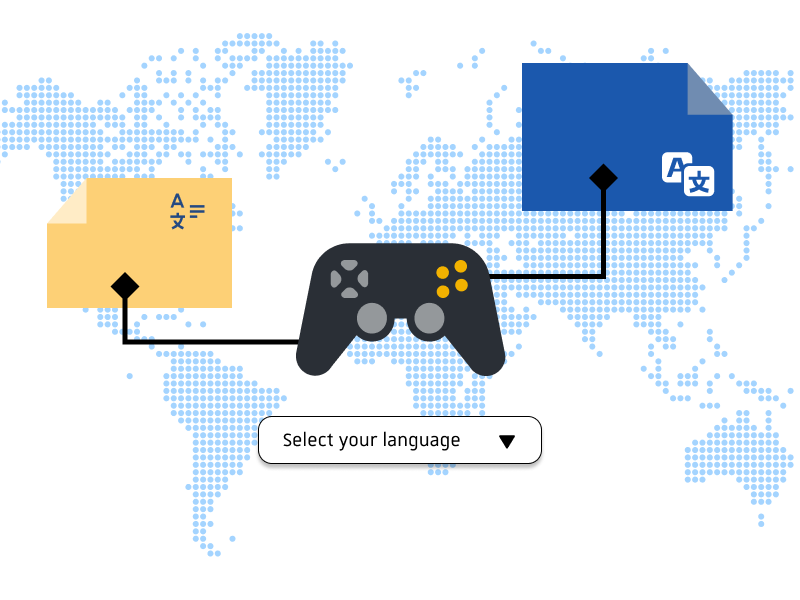Localization plays an important role in global business and it has become an essential strategy for organizations that wish to go beyond their national borders. The localization process varies depending on the product or application that is being localized: from dubbing a movie to adapting food flavors for different markets – but have you ever wondered what the video game localization process is like?
Unlike other applications, video games can be very complex and realistic, to the point that players immerse themselves completely in the story and its virtual world. To sustain a high-quality immersive experience, games must be adapted to the player’s preferences while preserving the appeal of the original version. A poor localization would be a nuisance for the players and negatively affect the game’s sales performance.
Video games are complex products and their localization of a video game is an equally complex process which must take into account multiple aspects. Translating content is only one piece of the puzzle. Cultural sensitivities or legal regulations might require parts of the game to be changed or altogether eliminated, whereas technical specifications might require developers to remap the game onto a different platform. Therefore, in order to ensure the successful international distribution of your video game, here are a few aspects that should be taken into consideration.
Choosing Your Target Audience
The first step of the video game localization process is researching the markets you wish to enter. It is important to understand the game culture and preferred genres in the target markets to be able to decide whether to localize or not. According to a study by Nimdzi (2020), most American players prefer action games, whereas in Japan dating simulators and robot-themed games are first choices, and Polish players prefer puzzle games. Factors like cultural norms, censorship and legal regulations could have a huge impact on the game’s reception. Additionally, it never hurts to keep an eye on competitors and see how successful their game was in the different target markets.
Choosing the Right Game Platforms
Not all markets support the same platforms. We can play “Candy Crush Saga” on Facebook in France, but not in China, where a better option would be WeChat. PC and console platforms are popular in Europe and North America, while most Asian gamers play on their smartphones. Thus, planning for and choosing the appropriate game platform is an essential part of the localization process. Furthermore, keep in mind that not all players have the latest and most powerful devices. A game should not be too heavy and still run on older hardware.

Choosing the Right Content to Localize
When a new video game is released, it usually happens simultaneously in all target languages. This frequently leads to short deadlines for the game localizers, and possibly to translation mistakes. To avoid this, publishers are expected to plan for localization in the early development stages and to provide guidance and support throughout the video game localization process. Another thing to consider is how much game content is to be localized. One of the most popular Chinese games, “Honor of Kings”, was fully localized for the Western market by removing many cultural references, changing its name to “Arena of Valor” and adopting a completely different interface. While the original version is more cartoonish, the localized version is darker and more realistic. In other cases, it is necessary to change or recreate the content altogether — this process is known as transcreation. For instance, quiz games contain different questions depending on the country they are sold in.
Localizing for Success
Game localization is a challenging, but exciting process that encourages thinking outside of the box. At the same time, the video game localization process is an integral aspect of the development of a successful business strategy. With the right mindset and careful planning, localization will continue to drive growth in the gaming industry.
Do you want to learn more about localization? Check out the TCLoc Masters’ Degree Program at the University of Strasbourg.



